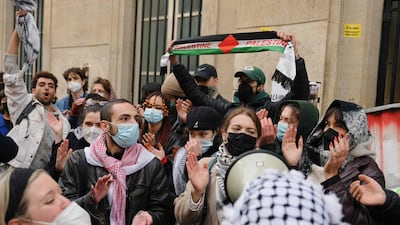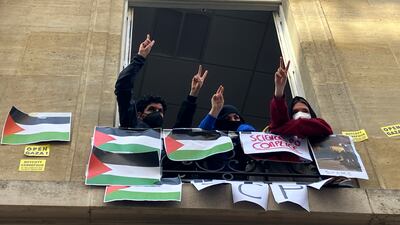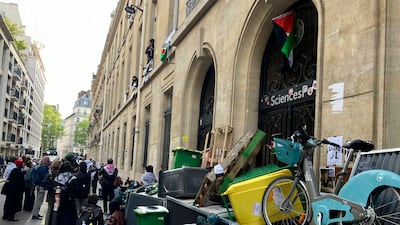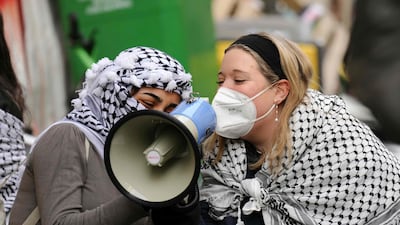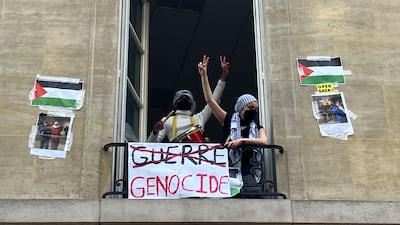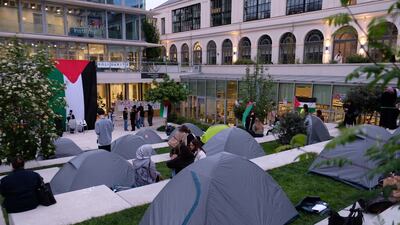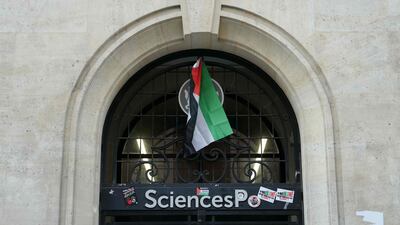Live updates: Follow the latest on Israel-Gaza
French police have broken up a sit-in by pro-Palestinian students in Paris, in a sign of US campus protests spreading to Europe, but demonstrators vowed to continue occupying university buildings as they demand bosses condemn and cut ties with Israel.
The prestigious Sciences Po university – whose alumni include French President Emmanuel Macron – is the scene of intensifying expressions of pro-Palestinian sentiment, students told The National.
"Students were inspired by what's happening in several American campuses, whether it's Columbia or Harvard," said one, who requested to remain anonymous due to the sensitivity of the topic.
Riot police said on Wednesday evening they had evacuated about 60 students "occupying" Saint Thomas campus in the heart of the upmarket neighbourhood of Saint Germain des Pres.
Encampments are a form of US-style campus protest. They are less common in French universities, where student typically physically occupy buildings to signify protest.
Protests in US universities have recently spread from the East to the West Coast, leading to a number of arrests in Texas on Wednesday.
The topic has become highly political as Republicans have accused students of anti-Semitism, a charge echoed by Israeli Prime Minister Benjamin Netanyahu.
While the White House has said it backs free speech on campus, senior Republican Mike Johnson has urged President Joe Biden to turn to National Guard troops.
In Paris, a slightly larger group of students returned to a separate Sciences Po campus on Thursday to occupy a main hallway, the student said, where they were joined by faculty staff.
"We are planning to stay," they said. "Students feel very supported by the community despite the context in France being hostile to pro-Palestine voices."
The student highlighted that a number of far-left French political figures who are critical of Israel have recently been called in for questioning by the police, accused of "apology of terrorism".
The far left was widely criticised for not explicitly condemning the Hamas-led October 7 attacks against Israel.
French police also banned a number of pro-Palestine protests that took place later in the year as Israel's military response in Gaza caused an unprecedented number of deaths in Gaza.
Student activists said they were "standing on the right side of history" over the Israel-Gaza war by "occupying the school until our demands are met".
The Sciences Po protest was viewed as "contributing to a strong climate of tension for students, teachers and employees", said a police statement to AFP.
Controversy erupted at the university last month after pro-Palestinian protesters were accused of barring entry to a Jewish student.
After students allegedly called "don't let her in, she's a Zionist", Mr Macron waded into the row to condemn those comments as "unspeakable and intolerable".
Senior government figures including French Prime Minister Gabriel Attal visited the university to "underline the seriousness" of what happened.
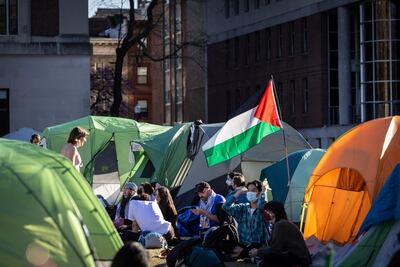
University chiefs said at the time they were taking legal action over anti-Semitic acts and regretted the "embedding of an unacceptable poisonous climate" on campus.
Officials in Europe and the US have grappled for months with how to balance free speech against public safety at Gaza protests.
Brussels awakes
In Brussels, where EU institutions are based, a small number of civil servants have been publicly calling for a ceasefire in Gaza.
Many say their expertise is ignored by political leadership and they fear becoming complicit in what the International Court of Justice in the Netherlands has described as a possible genocide in the making.
While the US has the most direct influence on Israel as its number-one weapons' provider, a minority of European leaders want to review a trade agreement with Israel due to concerns of human rights violations.
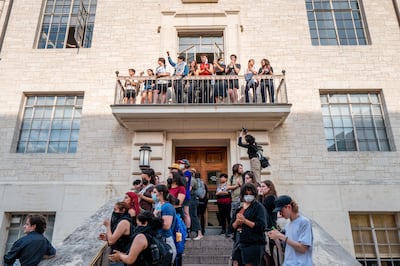
An EU civil servant, who took part in a 15-minute silent protest outside the European Commission building in Brussels on Thursday, told The National they welcomed protests on European campuses.
"The fact that our future leaders are aware of the ongoing double standards and the importance of applying ethics in the civil service is amazing," said the civil servant, who asked to remain anonymous for security reasons.
Police in Germany this month cut the power from a planned three-day Palestine Congress in Berlin after a banned speaker, an alleged Hamas sympathiser, dialled in virtually.
Lisbon takes heart
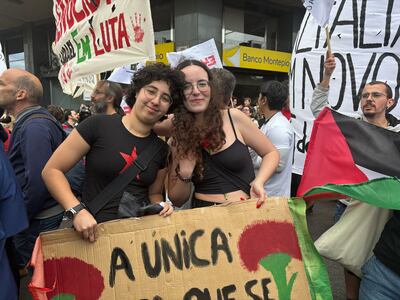
At the demonstrations marking the 50th anniversary of the Carnation Revolution, a Palestine bloc had formed at the centre of the march, with Palestinian flags peppered across the Marques de Pombal square.
Many demonstrators believe the spirit of the revolution that overthrew the longest-standing fascist dictatorship in Europe lived on in the Palestinian cause.
“We are here to fight for our Portuguese liberty, but also, we think that if Palestine is not free, no one in the world will be free,” said demonstrator Carolina Gonsalves, an international relations student at the Nova University.
Regarding the US campus movement for Gaza, she hoped a similar one would form in Portugal. “I think we can get there if we keep doing what we’re doing right now, and more,” she said.
“We are all connected and fighting for Palestine, we are one of the universities that fights the most for Palestine."
A student movement in Portugal was likely to have a “different look”, according to Catarina Rosario, a student in Lisbon.
“It’s not as much a struggle against the institutions, because they’re not directly supporting Israel as they are in the US or in the UK. So it’s much more about support than fighting our universities,” she said.
Among the protest events previously organised at her university was a large soup kitchen to feed people. “We occupied the entrance to the university and used that space to help the community,” she said.
Some feared the surge of the far right in Portuguese elections last month would tilt the country away from the Palestinian issue.
“I really love the message of our revolution, but I think it wasn’t complete. We could have done more. It’s really disheartening to see a country that fought against fascism, bring back fascism,” said Matilda, a veterinary student in Lisbon, who came to the protest carrying a Palestinian flag.
She expressed frustration over Portugal’s silence on the Israel-Gaza war.
“It’s really worrying to me, because our country hasn’t done a lot during this war, like cut ties with Israel. I’m really worried they’re going to do even less now,” she said.
“I would love to see that, I would love to be part of it."
She hoped to see more activity on campuses around the Palestinian issue.
“I think students need to organise and get together because there are a lot of students in Palestine, [whose] universities are destroyed. I think that should touch us in some way, but that’s not reaching as many people as I hoped,” she said.
Portugal’s revolution was triggered by the frustration with the country’s colonial wars and the spillover of South Africa’s apartheid into Mozambique, a former Portuguese colony.
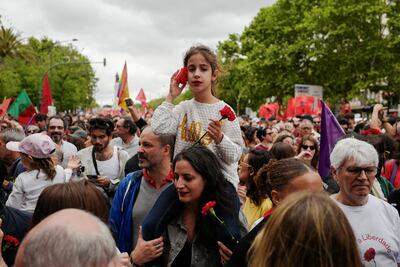
“We owe our freedom to liberation movements in South Africa,” said George Kadima, a former anti-apartheid campaigner who is now one of the organisers of the Palestinian bloc at the demonstration.
“As Nelson Mandela said, our freedom is not complete without the freedom of the Palestinian people.
“We thought that on this day, which is such a historic day for Portugal, the voice of Palestine had to be present, because Palestine is suffering tremendously."
